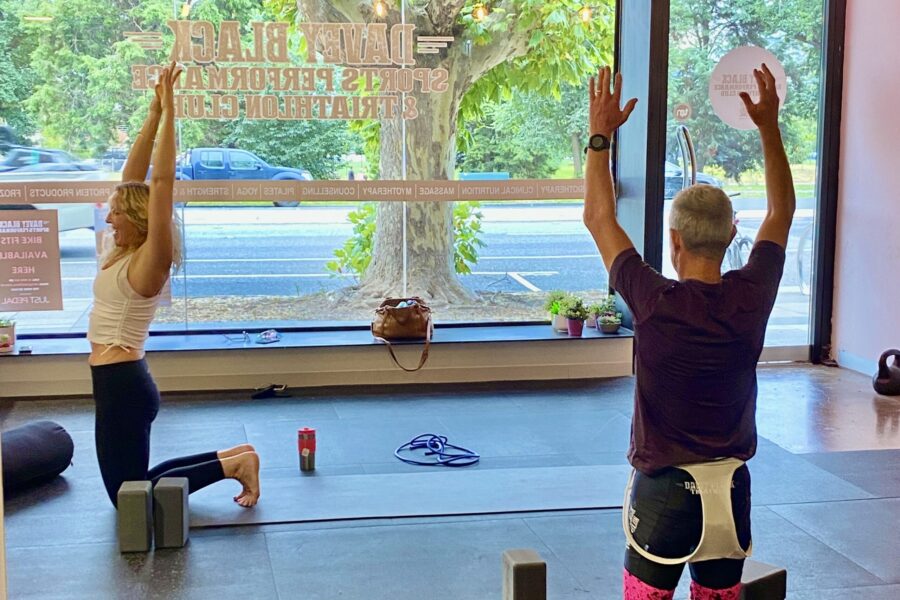Recovering from a triathlon race is as crucial as the preparation and execution itself. The physical and mental toll these events take on the body is significant, making post-race recovery an essential part of an athlete’s routine. Coach Steve Davis from Davey Black Triathlon Club Melbourne sets out a comprehensive guide on how to effectively recuperate and gradually re-enter training after completing a race.
The type and length of the race is going to have an impact on the type and length of recovery required. You will also have to take into consideration your overall training load, upcoming races, the time of the season, your age and your years of experience in the sport. These parameters are best discussed and planned out with your coach to make sure you meet you own individual recovery requirements.
Post-Race Recovery:
Immediate Aftermath:
- Hydration & Nutrition: Replenish fluids and nutrients lost during the race. Consume a balanced meal within 30 minutes of finishing, focusing on carbohydrates, proteins, and healthy fats to aid muscle repair. Davey Black Sports Performance Protein Recovery Powder is the perfect post-race recovery supplement.
- Active Recovery: Engage in light activities like walking, gentle stretching, yoga, a very easy swim, bike or other low-impact activity to prevent muscles from stiffening.
Rest and Rejuvenate:
- Sleep: Aim for quality sleep; it’s crucial for the body’s recovery and repair mechanisms.
- Massage and Compression: Consider massage therapy or compression garments to alleviate muscle soreness and enhance circulation.
Nutrition:
- Rehydration: Keep hydrating even after the race, focusing on electrolyte-rich fluids like sports drinks or coconut water.
- Nutrient-Dense Diet: Consume whole foods rich in antioxidants, vitamins, and minerals to support recovery. It’s always nice to treat yourself to some calorie dense fun foods, but don’t go over the top with it. Your body needs quality fuel for efficient recovery.
Gradual Return to Training:
Active Recovery Phase:
- Listen to Your Body: Gauge how your body responds to light exercise; avoid pushing too hard too soon. If you have any niggles or significant soreness, then let your triathlon coach know and adjust your sessions accordingly.
- Low-Impact Workouts: Incorporate low-impact activities like swimming, cycling, or yoga to gently engage muscles without intense strain.
Mobility and Flexibility:
- Stretching and Yoga: Focus on mobility exercises to regain flexibility and prevent stiffness. At the Davey Back fitness studio we offer post-race myofascial release sessions which are perfect for helping to rejuvenate sore muscles.
- Foam Rolling: Use foam rollers to release tight muscles and improve blood flow.
Building Back Into Training:
Structured Training Plan:
- Progressive Approach: Start with shorter, lower-intensity sessions and gradually increase duration and intensity over several days to weeks, based on the type of recovery required.
- Cross-Training: Include varied workouts to prevent overuse injuries and maintain overall fitness.
Strength and Conditioning:
- Strength Training: Incorporate strength exercises to rebuild muscle strength and prevent imbalances.
- Core Workouts: Strengthen your core, crucial for stability in all three triathlon disciplines. The less you damage your muscle by keeping good posture, the less time it will take to recover.
Mental Recovery:
- Reflect and Learn: Analyze your race performance, noting strengths and areas for improvement.
- Set New Goals: Establish realistic post-race goals to maintain motivation and focus.
Patience and Self-Care:
- Patience is Key: Allow ample time for recovery; rushing back into intense training can lead to injuries and burnout. Follow the sessions that your triathlon coach plans for you even if you are feeling good and feel like you want to train at intensity.
- Self-Care: Prioritise self-care practices like yoga, relaxation, and hobbies to maintain overall well-being.
Recovering from a triathlon is a personal journey; there’s no one-size-fits-all approach. Listen to your triathlon coach , listen to your body, adapt recovery strategies to your needs, and gradually reintroduce training. Effective recuperation not only aids physical recovery but also prepares the mind for future challenges. By nurturing your body and mind post-race, you lay a strong foundation for future successes in triathlon events.

